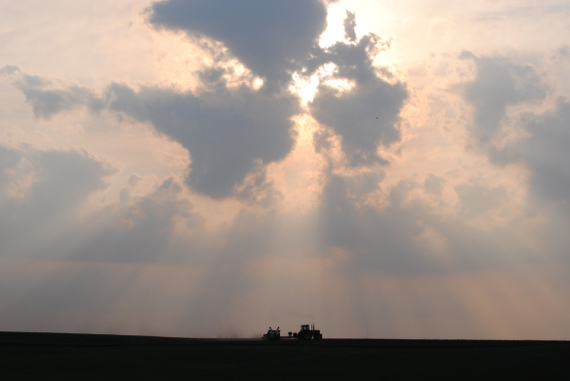"Navigable waters." According to the Internet, the accepted definition is: "deep and wide enough for boats and ships to travel on or through: capable of being navigated."
Apparently that's true for everyone... but the Environmental Protection Agency.
The new proposed ruling for the expanded Clean Water Act from the EPA is meant to clarify what is determined as "Waters of the U.S." In essence, almost any place that water could collect could be subject to regulation and the permitting process.
The CWA was started in 1972 as a way to curb pollution into what was determined navigable water from a single source -- without a federal permit.
Most people would probably be amazed at what all requires permission from someone else in order to simply do something... even on your own property. There are permits to build stuff, permits to take down stuff, permits to use water, permits to take away water -- I'm sure there are probably even agencies that have permits in order for another agency to allow permits. The process is essentially the same. You apply, based on whatever rules and regulations have been drawn up. You explain why you should be allowed a permit to complete whatever action or build whatever structure you have planned. You present your application with the proper fee, determined by the regulatory board or by law, and you wait to hear back.
Here's the catch: There is no legal right to be allowed a permit. That's right, even if you dot your I's and cross your T's and pay the fees and fill out each form in triplicate and you state sound reasons as to why your permit should be granted and have science on your side, you may be turned down. Because we all know that decisions don't always make sense.
And you may not find out if you've been granted a permit or if you've been turned down for days, or weeks, or months -- we all know how speedy the federal government works, right?
So let me try to wrap this up in a nut shell with a completely plausible scenario: Let's say you're a farmer that raises cattle, and cattle poop, and you want to use the natural fertilizer that you've been given. Let's say that the field you want to fertilize has a low spot that collects water when it rains. Imagine now having to fill out paperwork and a permit in order to use that fertilizer near that low spot because it may collect water at some point in time?
So why use the fertilizer? Well, it helps your crops grow to their potential, it provides better grass for our cattle and it's cheaper to use the product that nature is already providing. And remember, we're talking about a spot that may/may not hold water at any point in the year. Yet the amount of water held isn't in question. When the water is held there isn't in question. It's simply the ability for the ground to hold water that determines whether or not the CWA is applicable.
The good news? It's not too late. The proposed rule changes are open to public comment through July 21 by visiting the website at http://water.epa.gov/lawsregs/guidance/wetlands/CWAwaters.cfm.
Laws and regulations that expand government reach and hurt our local economies will continue to be passed unless we're willing to stand up and protect our rights for future generations. We need to let the EPA know that they need to #DitchTheRule.
My four boys drink from the hydrant in our yard. And there's nothing I would not do to ensure that our water is safe for generations to come. Our family farm has been making improvements to our methods of farming for generations, not through regulations and laws, but through using common sense and stewardship, as well as understanding how valuable healthy soil is to a healthy farm.
The CWA was set up to protect places that could float a boat. My field is not such a place. My ditch is not such a place. My yard is not such a place. Not a single one of these places could float my boat... and neither does this rule.
